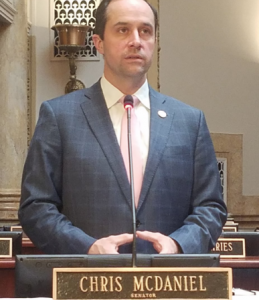By Tom Latek
Kentucky Today
A proposed constitutional amendment to limit the pardon power of Kentucky governors passed the state Senate Wednesday.
The measure, sponsored by Sen. Christian McDaniel, R-Taylor Mill, would ban gubernatorial pardons and commutations during the period 30 days before the election to Inauguration Day.

It came in response to former Gov. Matt Bevin pardoning hundreds of people, including convicted rapists, drug offenders, and even a murderer whose family held a fundraiser for Bevin. But McDaniel said past governors beyond Bevin had taken similar actions.
“The power of pardons allows one person to override the judgment of a police officer, prosecutor, grand jury,” McDaniel said during floor debate, “and in many cases appellate courts and in several of these cases the Supreme Court, and imposed his or her unilateral opinion upon the scales of justice.”
McDaniel noted a governor serves for 1,461 days and can still use the pardon power for 1,401 of those days.
“What this amendment does is to make sure that if a governor believes in a pardon strongly enough, he or she or their party can stand in front of voters to decide the voters’ opinions of those actions. There will be no more hiding in the darkness during the last minutes of an administration.”
He cited the example of convicted child rapist who was pardoned by Bevin.
“The day he walked free after serving less than 18 months of a 23-year sentence, she said, ‘Well, it figures. They always get away with it.’ I ask you today, is this justice or do the citizens of the Commonwealth deserve a chance to vote on a small limitation of the power of one person to decide that murderers, rapists drug dealers can get away with it?”
A proposed amendment by Senate Minority Leader Morgan McGarvey, D-Louisville, to allow the release of a death row inmate who was cleared by exculpatory evidence during that time period failed on a voice vote.
The measure passed 33-4 and now heads to the House.
No more than four constitutional amendments can be on the November ballot, normally two that originated in the House and two that originate in the Senate. The Senate approved two this week this week alone, Marsy’s Law and the pardon measure.
Senate President Robert Stivers, R-Manchester, explained how it is decided which four will appear.
“We’re going to send ours down to the House and let them review them. They’re going to send theirs to us. We’ll sit down later in the session and pick which four go to the ballot.”
He added: “To keep the process open and keep all doors and avenues available to us, we’re going to put them all in each other’s chamber and as the process goes through determine which four if we determine we want to do four, we will send to the Secretary of State to be placed on the ballot.”
Stivers says that includes discussions with House leadership on choosing the four that voters will be able to consider.

















